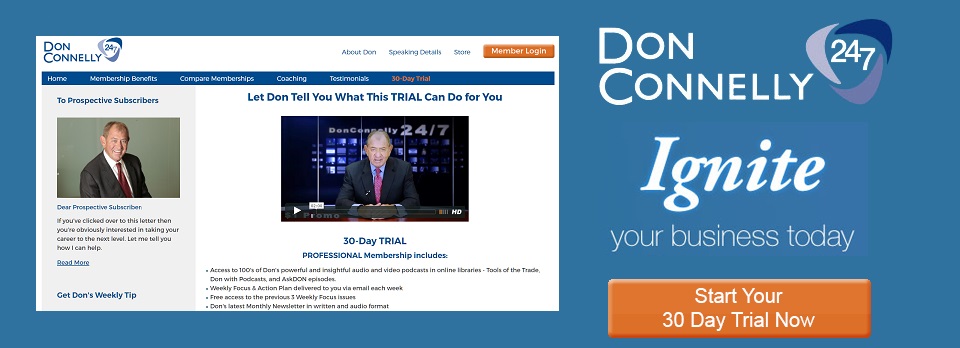Differentiate Yourself by Seeing Things from Your Clients’ Point of View
 Differentiation is one of the biggest challenges financial advisors face. Clients expect you to have solid products, fair prices and a certain measure of performance as standard. But simply having the right credentials won’t demonstrate to them why you are uniquely placed to help them achieve their dreams and goals. If you really want to stand out from the competition you need to fulfill their expectations on another level. Among other attributes, you need to have empathy; the ability to see things from your clients’ point of view.
Differentiation is one of the biggest challenges financial advisors face. Clients expect you to have solid products, fair prices and a certain measure of performance as standard. But simply having the right credentials won’t demonstrate to them why you are uniquely placed to help them achieve their dreams and goals. If you really want to stand out from the competition you need to fulfill their expectations on another level. Among other attributes, you need to have empathy; the ability to see things from your clients’ point of view.
Clients want to know they can trust you
When someone opens an account with you it’s a tremendous obligation on their behalf. They’re not simply making a one off transaction, they’re agreeing to a long term relationship. If you want to differentiate yourself and build the trust that’s needed to undertake this commitment you need to step into their shoes. Understand their goals as well as they do. Understand their fears, too, and how to alleviate them.
To become valued and irreplaceable you need to go that extra mile. You need to be dedicated, passionate and enthusiastic. Share your personal story with your clients to build trust and differentiate yourself from other advisors.
When you talk to clients don’t focus on dry, mundane financial data and market updates – they will not provide you with a way to connect on an emotional level. Use the right language when you’re building trust with prospects and clients. Convoluted messages will not work. Take out unnecessary words. Move conversation away from financial data and tell stories that stir up your clients’ emotions.
Recommended products to hone your storytelling skills
- 2-CD set, mp3 version – Say it So It Makes a Difference
- Webinar Replay – How to Use Stories and Analogies to Influence and Persuade
- Webinar Replay – How to Create and Tell Great Stories, Part I
- Webinar Replay – The Six Essential Stories Advisors Need to Turn Prospects Into Clients, Storytelling Part II
Clients are looking for honesty
Don’t make bold statements you can’t live up to. Don’t overpromise your abilities. Anticipate objections, raise them then deal with them proactively. If you acknowledge potential negatives upfront your clients and prospects will learn to trust you more.
Be transparent. Your clients don’t mind the commissions and fees, it’s the mystery behind them they hate. Be honest with clients. It’s OK to say “I don’t know”. It’s even OK to get it wrong from time to time. Just be open and admit it, be the first to initiate a discussion. They will thank you for your honesty.
Clients want you to be part of their lives
Take the time to understand your clients by networking with them. Learn what you have in common with them. Find ways to stay in touch on a regular basis. Get out from behind the computer and participate in your clients’ community and professional events. Be a guest speaker at a client’s networking group. Pick up the phone and meet in person, maybe for a lunchtime catch up. Schedule regular phone time to check in with clients and see if they have any concerns.
Clients need you to take the helm
From a client’s point of view their financial exposure to risk is enormous, so you need to manage their expectations. To them, losses hurt a lot more than gains can satisfy. They also have the means to measure their gains and losses and can check prices constantly. This makes the horizon shorter – with the potential for them to become even more risk averse. So how do you keep clients invested?
You need to understand the big picture. They’re generally not trying to get super- rich, but they are afraid of being poor in retirement. They want to know they are on course to get the income they want at age 65. Clients need to be persuaded to keep on track through thick and thin, so you need to be firm. Never doubt the outcome, and be assertive. They need your certainty to help them achieve their goals.
The strength of their relationship with you will determine the financial outcome in tumultuous times. Clients feel unease in direct proportion to the doubt they feel in their relationship with you. Financial markets are always going to be unstable. It’s how you respond to them that will shape their future. You must convince them that the game plan is meant to be followed. Believe in yourself and your ideas, and convince your clients that what happens today is not going to seem nearly as important 10 years’ hence. They want to be able to rely on your choices. That’s why they selected you to manage their affairs.
Clients need you to stay strong
Ships weren’t built to stay in port; they’re made to weather the storm. The more tumultuous the times, the stronger you have to be for your clients. The worse things get, the more clients need you. They look to you as their pillar of strength.
When bad times present themselves, be sure to focus on your clients’ goals. Assure them that bad markets are followed by good markets. Always be long term.




